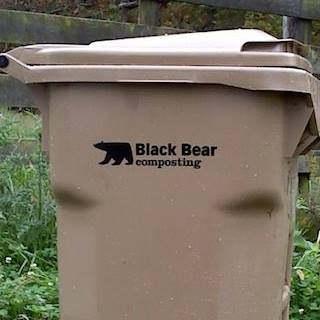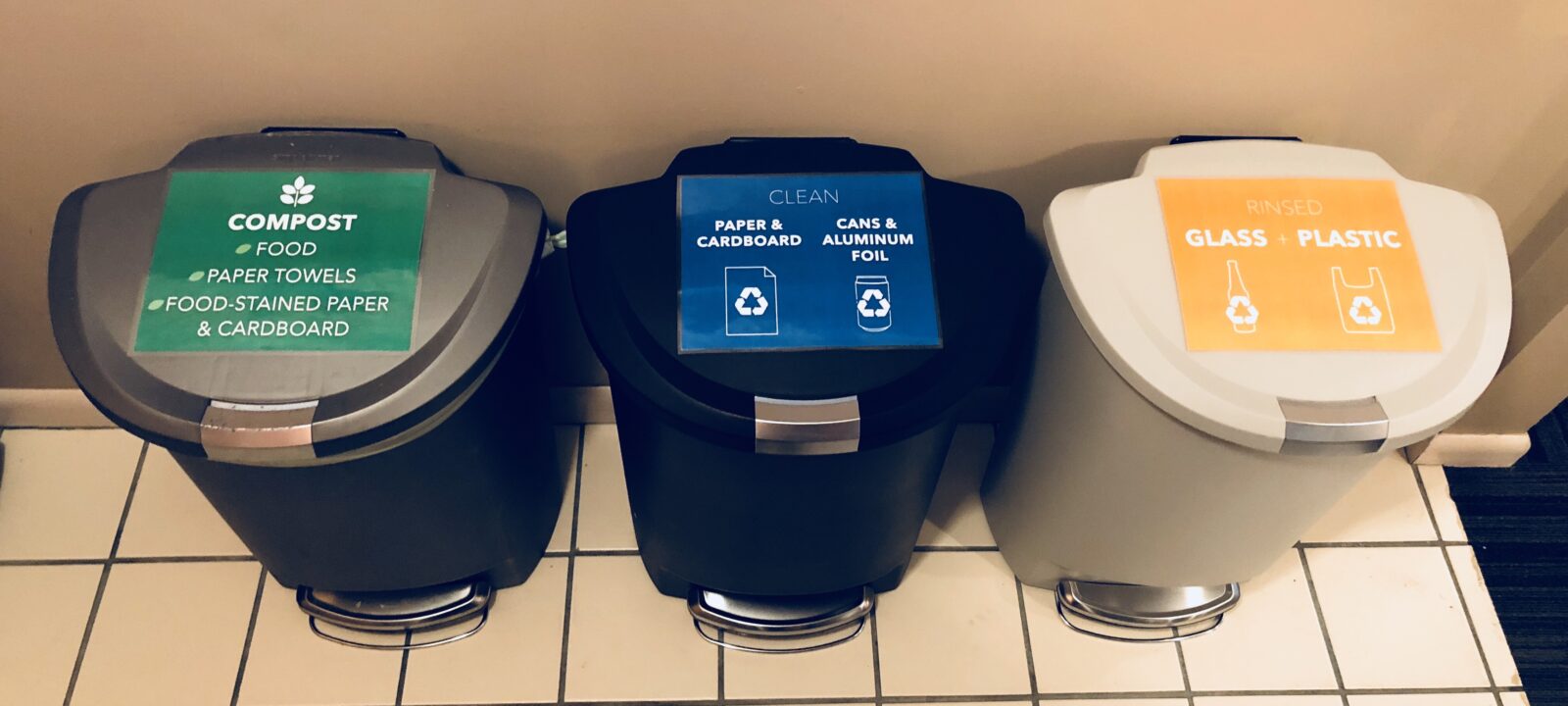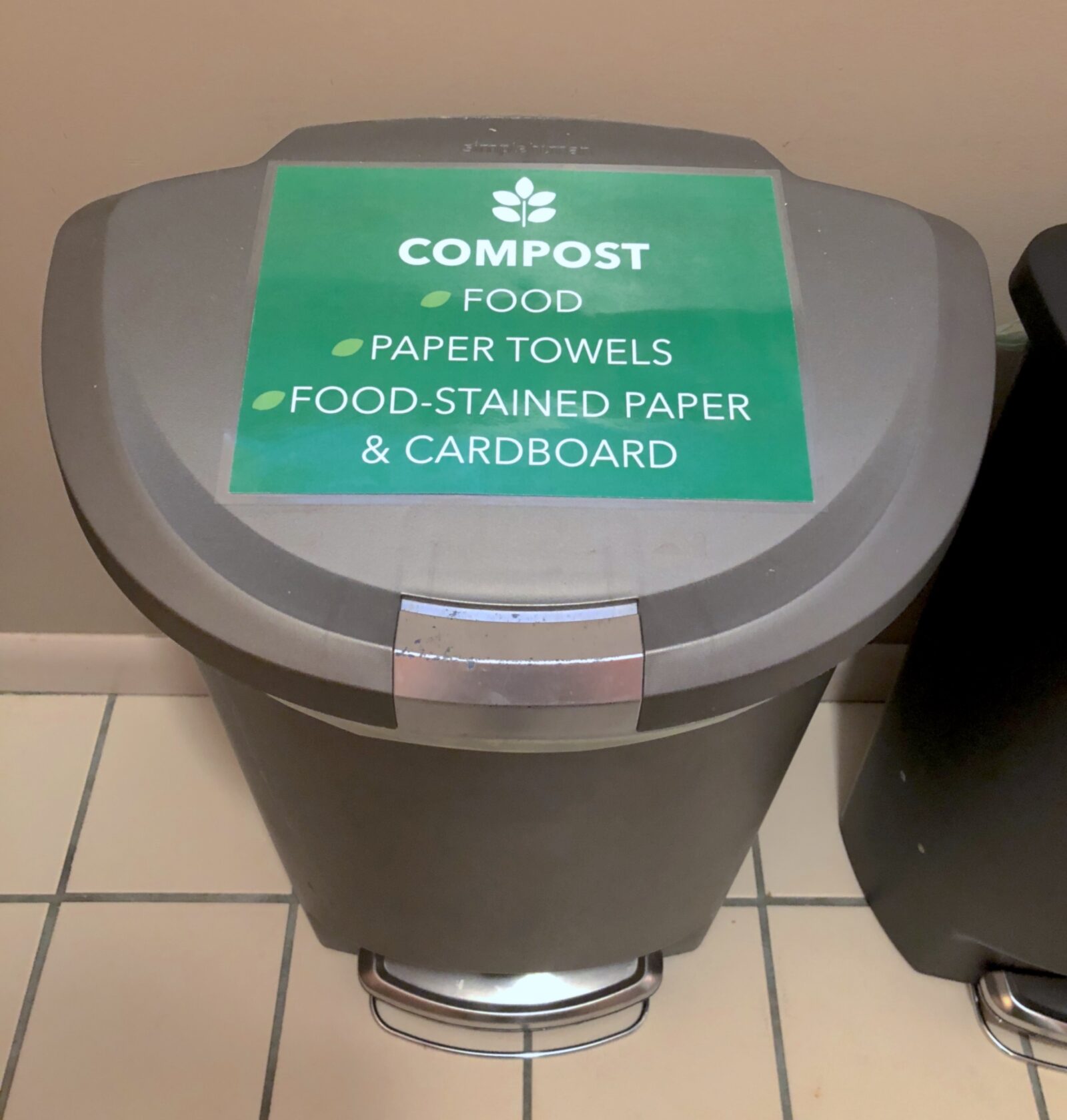Table of Contents
At Gravity, we’ve been composting our food waste for over a year and a half in an effort to reduce our carbon footprint. Since we started our composting program, we’ve significantly decreased our trash, while at the same time reducing greenhouse gases, helping produce healthy soil for our community, and supporting a sustainable business, all for a relatively low investment of time and money.
Black Bear Composting has had a compost bin at the Harrisonburg Farmer’s Market for some time now, but you may be surprised to know they also offer compost pick up in the Harrisonburg area, and it’s great. It somehow manages to be both convenient and affordable, and it’s a great way to reduce your business’s carbon footprint and set a positive example in our community. After over a year of composting our food waste at Gravity, we thought we’d share the resources we’ve developed to make composting work in an office setting in the hopes that it might inspire a few other businesses to jump on board. And good news: if office composting isn’t an option for you, they do residential pick up as well!
Why Composting Makes a Difference
When food goes to the landfill, it doesn’t decompose properly. Instead, it produces methane, a highly-potent greenhouse gas (72 times more potent than CO2!). However, when you compost, you turn food waste back into food by keeping trash out of the landfill, and producing nutrient-rich soil that can be used locally to grow more food.
The State of Composting Report found that nearly half of the 164 million tons of trash that goes to U.S. landfills each year could be composted. It’s empowering to imagine chipping away at that number through our local composting efforts.
Commercial Composting in Harrisonburg

We are lucky to have our very own commercial composting facility in this region. Black Bear Composting is located in Crozet, near Charlottesville, VA. They run compost pick up throughout our area, including in downtown Harrisonburg.
One of the great things about using a commercial composting service is that all foods can be composted, even oils and meat products. This vastly simplifies the task of educating people in the office about what can and can’t be composted: anything you can eat can go in the bin. This is very different from backyard composting, where you need to pick through foods to remove any meat products or fats.
How to Implement Composting in the Office

While signing up for composting service is easy, it’s the logistics of setting up the office and continually managing the pickup that can be complicated. Here is a guide to smooth the way.
Getting Buy-In
Of course, the first hurdle is getting buy-in from others in the office for the composting program. First, there’s the initial buy-in from leadership to approve the cost and time. Then, in order for a composting program to work, office employees need to be dedicated to composting their leftovers, and must understand composting well enough to avoid putting non-compostable materials in the bin. Commercial composting makes this easier, since all foods are accepted, but there are some edge cases that can confuse people, which I’ve listed below.
What Can be Composted
- All foods
- Paper or cardboard that has been stained with food (see exceptions below)
- Paper towels
Exceptions that Confuse People
- “To go” coffee cups: these may be made of paper, but if they’re lined on the inside with plastic, they can’t be composted (or even recycled, for that matter)
- Plastic-lined “to go” containers: For that matter, a lot of paper or cardboard to go containers are lined with plastic on the inside, to avoid leakage. Before putting something like this in the compost bin, check that there’s no plastic lining inside.
- Wax paper
Composting Kick Off
To kick off our office composting initiative, we held a team meeting where I presented the reasons for composting, and talked about how composting works, so that everyone understood what was involved and why were were undertaking the effort. We all came away inspired to see if we could make this work at Gravity, and despite a few bumps in the road (like when we realized our housekeeper was emptying trash bins into the compost), we’ve gotten to a place where it’s running smoothly.
Helpful Resource: The Gravity Group Composting Presentation
The kickoff is important, but there will likely be an adjustment period. For the first few months, it’s helpful to have someone periodically glancing in the compost bin to be sure nothing is being composted that shouldn’t be, and sending gentle reminders about what can and can’t go in.
Tip: Find an office “Composting Champion” or “Compost Team” to manage the kickoff process, and help guide employees through the first few months.
Bins, Bags, and Signs
 In our kitchen, we installed a professional-looking, and user-friendly compost bin with very clear signage about what can and can’t be composted. We found that we needed heavy duty compost bags in order to avoid the bags splitting when we emptied them. We installed a second compost bin in our bathroom, for paper towels. This drastically cut down on our trash volume.
In our kitchen, we installed a professional-looking, and user-friendly compost bin with very clear signage about what can and can’t be composted. We found that we needed heavy duty compost bags in order to avoid the bags splitting when we emptied them. We installed a second compost bin in our bathroom, for paper towels. This drastically cut down on our trash volume.
Helpful Resource: Gravity Group Composting Signs
As far as where to store compost bags when they’re full, Black Bear Composting provides a large, heavy-duty bin for storing compost, similar to a trash bin that you might use for curbside pickup. This bin needs to go out on the curb on pick up days, or if you have an accessible storage shed, you can arrange to have them get the bin from the shed on pick up days. We found it useful to fit our shed with a heavy duty combo lock, and we shared the combination with Black Bear, so they can get our compost without any intervention on our part. This makes pick up completely painless, requiring no scheduling or coordination.
Can you Implement Composting at the Office?
It’s been incredibly rewarding to see our volume of trash shrink as we’ve composted over the last year and a half. We hope that this post helps anyone who’s been trying to implement ways to reduce waste in their office, but has been too strapped for time to figure out the logistics. Best of luck with your composting adventures, and let us know how it goes!
